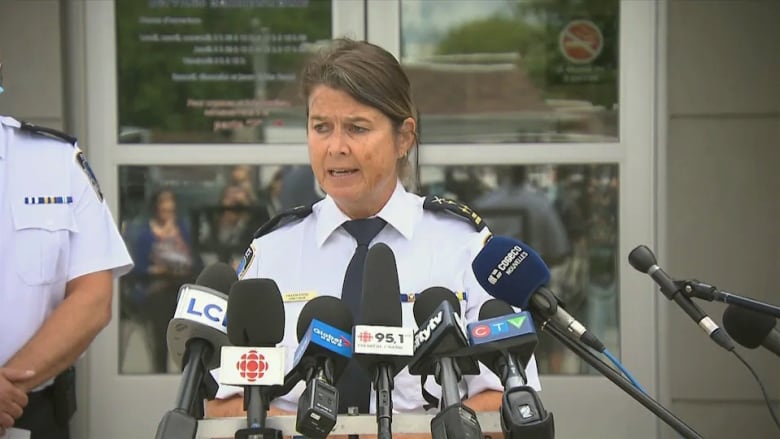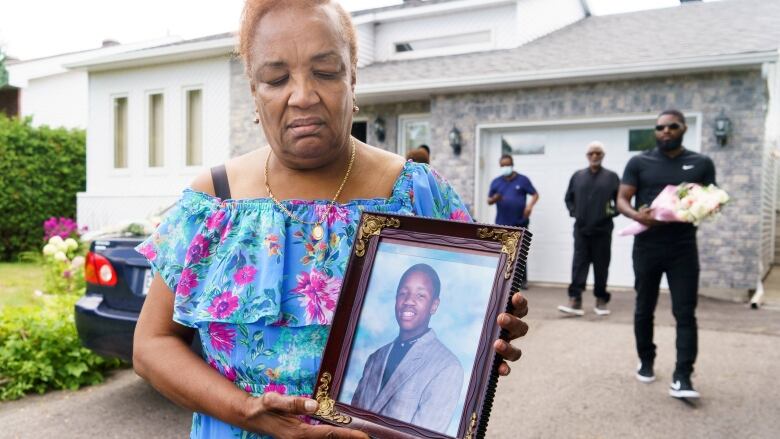Social workers in Repentigny, Que., to respond to mental crisis calls alongside police officers
Social workers with diverse backgrounds needed, says advocate with Black Mental Health Connections

Officers in a cityjust east of Montreal will be responding to mental crisis situations alongside social workers, the Repentigny police service announced Friday.
And if the situation is non-violent, social workers may respond to the call alone in plain clothes and in an unmarked vehicle, said Repentigny police Chief Helen Dion.
The initiative is the result of acollaboration between the regional health authority, CISSS de Lanaudire, and the provincial Health Ministry.
"This project aims to better adapt the support we offer to the population," said Dion.
She said 40 per cent of 911 calls made in2021 were related to a mental crisis and to respond to these calls, specialized personnel are better suited to help.
When a plainclothessocial worker shows up to assist someone, it will be clear that there is no threat of arrest, and the CISSSwill be able to follow up on the call, said Dion.
The police service will have six social workers on the team, two of which will be assigned by the CISSS.
Dion said the project has matured over some time as officials work to improve the way police intervene when someone is in a mental crisis. Working with the CISSS, officers have gone through specialized training and health officials will continue to be involved with each case.
Police killed man in mental crisis
Last August, Marie-Mireille Bence called Repentigny police asking them to bring her son, Jean Ren Junior Olivier, 37, to the hospital because he was having a mental healthissue.
Instead of helping him, Bence said, six police officers arrived at her doorstep and shot him in the stomach. When police arrived, he had been holding a dinner knife, but the family said he had dropped it.
Aisha Seivwright, speaking for the organization Black Mental Health Connections, said Repentigny police have repeatedly racially profiled Black men, including Olivier.

The fact the police service will have social workers responding to calls is better than armed police officers showing up on the scene of a mental crisis.
"But at the same time, I do worry about the people showing up being aware of cultural nuances to really be able to genuinely empathize with the individuals and really giving them tangible support to talk them down," she said.
That's why it's important to include people from diverse backgrounds in mental health units,Seivwright explained.
Dion said people from diverse backgrounds with appropriate credentials are invited to apply for the job.
Plan predates fatal police shooting, chief says
Dion said the decision to include social workers in mental crisis calls is not related to Olivier's shooting death, and predates that incident.
"The police must develop new ways of doing things, be open, create diversity and inclusion," she said.
"We want to do community policing, to make ourselves known and to make known what we do, because people don't know the role of police officers. Why are we asking for identification? Why are we stopping a vehicle?"
In a statement, she says this new psychosocial unitrepresents an "innovative model in community public safety." She says it will be able to respond more appropriately to the changing needs of the population and to current problems in the field.
The statement says social workers who respond to a call without officers will always have backup if the situation escalates. Meanwhile, the statement said, police officers will be free to respond to other types of calls.
The police service is "innovating once again with an intervention model that is unique in Quebec and adapted to the reality of our city," says Repentigny Mayor Nicolas Dufour in the statement.
with files from Radio-Canada and CBC's Jennifer Yoon












_(720p).jpg)


 OFFICIAL HD MUSIC VIDEO.jpg)
.jpg)



























































































